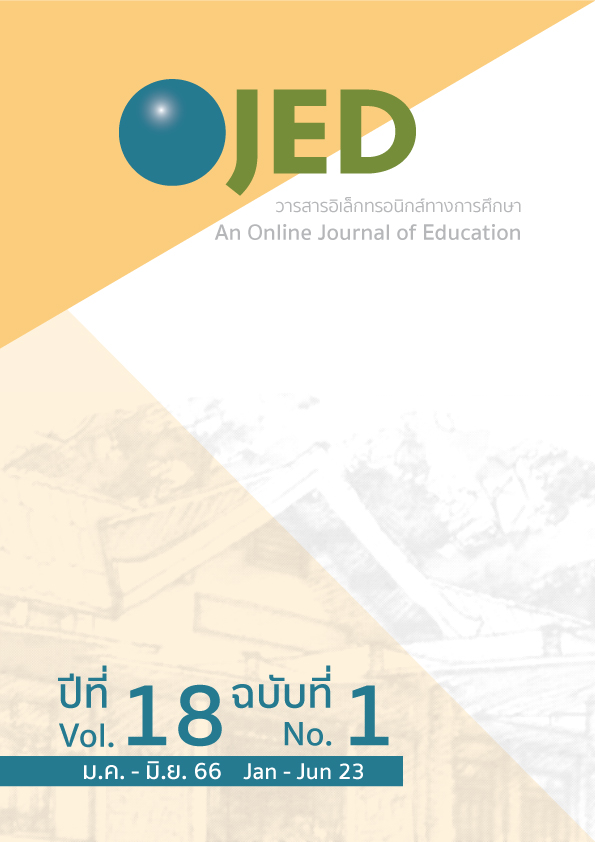Results of Using an Inquiry Training Model to Enhance Delayed Gratification for First Graders During a Transitional Period
DOI:
https://doi.org/10.14456/ojed.2023.6Keywords:
delayed gratification, inquiry training model, transitional periodAbstract
The objective of the research was to compare delayed gratification scores of first graders before, during, and after the use of an inquiry training model. The sample of this study was 14 first graders
who were selected using purposive sampling and were studying in the first semester during a transitional period of the 2022 academic year at a private school under the Office of the Private Education Commission (School in Bangkok). The research instruments were lesson plans using an inquiry training model and an assessment form of delayed gratification. The inquiry training model has 5 phases which are encountering the problem, data gathering, making an assumption, creating an explanation, and question analysis. The data were analyzed using arithmetic mean, standard deviation, dependent t-test, and qualitative analysis. This study found that the first graders’ overall mean scores for delayed gratification after using the inquiry training model was higher than the pre-test mean with a statistical non-significance at the .05 level. Their delayed gratification change occurred gradually, and the students were able to wait more patiently and peacefully.
References
ภาษาไทย
เกรียงศักดิ์ เจริญวงศ์ศักดิ์. (2551). เรียนให้รู้: ใช้ข้อมูลอย่างผู้ชนะ (พิมพ์ครั้งที่ 2). ซัคเซส พับลิชชิ่ง.
กรมสุขภาพจิต. (2560, 28 พฤษภาคม). กรมสุขภาพจิตพบเด็กไทยป่วยโรคไฮเปอร์กว่า 4 แสนคน. ฐานเศรษฐกิจ. https://www.thansettakij.com/business/154920
ทิศนา แขมมณี. (2560). ศาสตร์การสอน (พิมพ์ครั้งที่ 21). สำนักพิมพ์แห่งจุฬาลงกรณ์มหาวิทยาลัย.
ธิดา พิทักษ์สินสุข. (2562). วิกฤตปฐมวัยกระทบอนาคตชาติ. วารสารการจัดการทางการศึกษาปฐมวัย, 1(1), 77–89. https://doi.org/10.14456/jecem.2019.7
นวลจันทร์ จุฑาภักดีกุล, ปนัดดา ธนเศรษฐกร, และ อรพินท์ เลิศอวัสดาตระกูล. (2560). การพัฒนาและหาค่าเกณฑ์มาตรฐานเครื่องมือประเมินการคิดเชิงบริหารในเด็กปฐมวัย. ศูนย์วิจัยประสาทวิทยาศาสตร์ สถาบันชีววิทยาศาสตร์โมเลกุล มหาวิทยาลัยมหิดล.https://doi.nrct.go.th/ListDoi/Download/376598/ee05c1f7db78706dc25d420dec2fc95f?Resolve_DOI=10.14457/MU.res.2017.7
สำนักงานคณะกรรมการพัฒนาเศรษฐกิจและสังคมแห่งชาติ. (2559). แผนพัฒนาเศรษฐกิจและสังคมแห่งชาติ ฉบับที่สิบสอง. https://www.nesdc.go.th/ewt_dl_link.php?nid=6422
สุภาวดี หาญเมธี. (2558). EF ภูมิคุ้มกันชีวิตและป้องกันยาเสพติด. รักลูกบุ๊คส์.
ภาษาอังกฤษ
Casey, B. J., Somerville, L. H., Gotlib, I. H., Aydek, O., Franklin, N. T., Askren. M. K., Jonides, J., Berman, M. G., Wilson, N. K., Teslovich, T., Glover, G., Zayas, V., Mischel, W., & Shoda, Y. (2011). Behavioral and neural correlates of delay of gratification 40 years later. PNAS, 108(36), 14998-15003. https://doi.org/10.1073/pnas.1108561108
Cheng, Y., Shein, P. P., & Chiou, W. (2012). Escaping the impulse to immediate gratification: the prospect concept promotes a future-oriented mindset, prompting and inclination towards delayed gratification. British Journal of Psychology, 103(1), 129-141.
Damanik, A. M. & Siregar, A. M. (2013). The difference of students’ learning outcomes using inquiry training model and direct instruction model. INPAFI, 1(3), 229-237.
Daniels, D. H. & Clarkson, P. K. (2010). A developmental approach to educating young children. Corwin Press.
Doebel, S. & Munakata, Y. (2018). Group influences on engaging self-control: children delay gratification and value it more when their in-group delays and their out-group doesn’t. Psychological Science, 29(5), 738-748. https://doi.org/10.1177/0956797617747367
Garon, N. M., Longard, J., Bryson, S. E., & Moore, C. (2012). Making decisions about now and later: development of future-oriented self-control. Cognitive Development, 27(3), 314-322.
Gawrilow, C., Gollwitzer, P. M., & Oettingen, G. (2011). If-then plans benefit delay of gratification performance in children with and without adhd. Cognitive Therapy and Research, 35, 442-455. https://doi.org/10.1007/s10608-010-9309-z
Gollner, L. M., Ballhausen, N., Kliegel, M., & Forstmeier, S. (2018). Delay of gratification, delay discounting and their associations with age, episodic future thinking, and future time perspective. Frontiers in Psychology, 8(2304), 1-15. https://doi.org/10.3389/fpsyg.2017.02304
Harahap, M. B., Manurung, S. R., Marbun, M. A., & Mihardi, S. (2016). Effect model inquiry training on student’s science process skill. Advances in Social Science Research Journal, 3(11), 38-42. https://doi.org/10.14738/assrj.311.2288
Joseph, N. A. (2015). Delayed gratification behavior among elementary school children: an intervention model. Journal of Research Initiatives, 1(3), 1-13.
Joyce, B. R., Weil, M., & Calhoun, E. (2009). Models of teaching (8th ed.). Pearson.
Kooij, D. T., Kanfer, R., Betts, M., & Rudolph, C. W. (2018). Future time perspective: a systematic review and meta-analysis. Journal of Applied Psychology, 1-27.
Mischel, W., Ebbesen, E. B., & Zeiss, A. R. (1972). Cognitive and attentional mechanisms in delay of gratification. Journal of Personality and Social Psychology, 21(2), 204-218.
Mischel, W. (1974). Processes in delay of gratification. Advances in Experimental Social Psychology, 7, 249-292. https://doi.org/10.1016/S0065-2601(08)60039-8
Mischel, W., Shoda, Y., & Rodriguez, M. L. (1989). Delay of gratification in children. Science, 244(4907), 933-938. https://doi.org/10.1126/science.2658056
Mischel, W., Shoda, Y. & Peake, P. K. (1990). Predicting adolescent cognitive and self-regulatory competencies from preschool delay of gratification: identifying diagnostic conditions. Developmental Psychology, 26(6), 978-986.
Moffitt, T. E., Arseneault, L., Belsky, D., Dickson, N., Hancox, R. J., Harrington, H., Houts, R., Poulton, R., Roberts, B. W., Ross, S., Sears, M. R., Thomson, W. M., & Caspi, A. (2011). A gradient of childhood self-control predicts health, wealth, and public safety. PNAS, 108(7), 2693-2698. https://doi.org/10.1073/pnas.1010076108
Neitzel, J. (2018). What measures of program quality tell us about the importance of executive function: implications for teacher education and preparation. Journal of Early Childhood Teacher Education, 39(3), 181-192. https://doi.org/10.1080/10901027.2018.1457580
Reyna, V. F. & Zayas, V. (2014). The neuroscience of risky decision making. American Psychological Association.
Schlam, T. R., Wilson, N. L., Shoda, Y., Mischel, W., & Ayduk, O. (2013). Preschoolers’ delay of gratification predicts their body mass 30 years later. The Journal of Pediatrics, 162(1), 90-93.
Sihaloho, H. W., Sahyar, & Mariati, P. S. (2017). The effect of inquiry training model on science process skills and student learning outcomes. IOSR Journal of Research & Method in Education, 7(6), 46-51.
Tobin, R. M., & Graziano, W. G. (2010). Delay of gratification: A review of fifty years of regulation research. In R. H. Hoyle (Ed), Handbook of personality and self-regulation (pp. 47-63). Wiley-blackwell.
UNICEF. (2012). School readiness and transitions. https://www.oxfordshire.gov.uk/sites/default/files/file/schoolreadinessandtransitionsunicef.pdf
Yu, J., Kam, C., & Lee, T. M. (2016). Better working memory and motor inhibition in children who delayed gratification. Frontiers in Psychology, 7(1098), 1-7. https://doi.org/https://doi.org/10.3389/fpsyg.2016.01098
Downloads
Published
How to Cite
Issue
Section
License
Copyright (c) 2023 An Online Journal of Education

This work is licensed under a Creative Commons Attribution-NonCommercial-NoDerivatives 4.0 International License.




